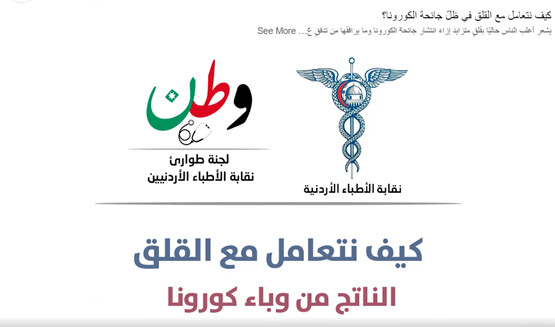
Introduction
COVID-19 lockdowns and fear of infection have had a huge impact on the Jordanian society, increasing the demand for mental health and psychosocial support services. Older adults and children were especially affected due to the isolation and abrupt changes in their routines. People with pre-existing mental health conditions suffered temporary interruptions to their medication supply.
To address these emerging needs and ensure continuity of services throughout the pandemic, Jordan implemented a number of mental health and psychosocial support measures at national level. The Ministry of Health included mental health and psychosocial support interventions into essential health services, to ensure that these interventions be maintained throughout the pandemic, and avoid having them halted at any point. Moreover, several working groups were established to support the implementation of the response plan and facilitate coordination between all sectors involved. In addition to the efforts of ensuring provision of mental health support to people in need, the Jordanian Association of Psychiatrists donated 20 000 Jordanian Dinars to support the Ministry of Health’s efforts in limiting the spread of the COVID-19 virus.
Mental health and psychosocial support services
During lockdowns, the Directorate for Disability and Mental health remained open. It received referrals and calls, and provided the needed care and support, which was particularly important for people with disabilities. Additionally, the Directorate organized four workshops in collaboration with the Syrian American Medical Association for healthcare staff on psychological first aid.
The Jordanian Medical Association, in collaboration with the National Center for Mental Health launched the “Watan” initiative to deliver free and direct treatment to patients in their homes during periods of lockdown and movement restrictions.
Emergency response teams consisting of psychiatrists were deployed to clinics in different geographic locations across the country – North, Middle and South.
The National Center for Mental Health provided psychological support services to healthcare staff in COVID-19 specialized hospitals and quarantine facilities. The Center also organized group psychological support sessions and short training courses for healthcare staff in the Prince Hamza Hospital dedicated to COVID-19.
COVID-19 mental health hotlines
Mental health consultations and psychosocial support were offered to the public through two dedicated hotlines. The first hotline (+962 795 785 095) was established by the Ministry of Health, the Jordanian Association of Psychiatrists, and the International Medical Corps. The hotline offers 24/7 mental health and psychosocial support, including referral for medications and follow-up consultations. Support services are provided by a large team of case managers, which include 47 psychiatrists and 25 psychologists. Additionally, a group of volunteer doctors deliver medications to patient homes.
The second hotline (+962 795 440 416; +962 796 206 768; +962 787 700 373) was established by the Jordanian Clinical Psychologists Association. The hotline offers mental health and psychosocial support services from 9:00 a.m. to 9:00 p.m. daily. Support services are provided by specialist clinical psychologists.
Education, awareness and mental health promotion
The National Center for Mental Health in collaboration with various media outlets launched several initiatives centered around increasing awareness about mental health issues during the pandemic. They shared information on the psychosocial aspects of the COVID-19 response, and on coping with COVID-19, as well as key messages and information produced by WHO, and used various social media platforms to do so.
Lessons learnt and way forward
Emergency response plans must be developed in advance and healthcare staff should receive training on emergency response measures as part of the country’s emergency preparedness.
Healthcare staff need more extensive training on mental health, especially on self-care practices and supporting people who experienced a traumatic event.
Multisectoral collaboration – governmental, nongovernmental organizations, civil society organizations, and international organizations – is essential for maintaining mental health and psychosocial support services, and for scaling up these services to meet the increasing demand and emerging needs (e.g. home delivery of medications, remote services) resulting from the COVID-19 pandemic.
Updating healthcare services is critical, to enable the delivery of mental health services remotely and to ensure the link between remote services and appropriate infrastructure.
Increasing media coverage around mental health issues and services delivered through the Ministry of Health and partners is equally as important.








